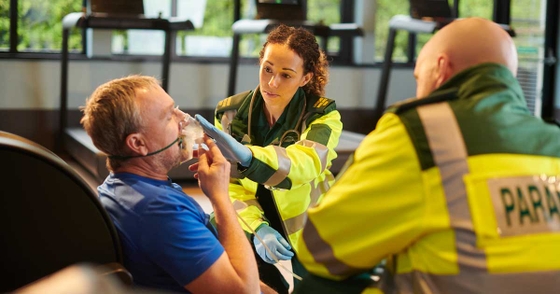Australia to build world’s largest sudden cardiac arrest registry
Media release: 22 December 2023
Australian scientists will build the world’s largest-ever registry of sudden cardiac arrest deaths in a major bid to solve one of the most elusive and frightening mysteries of cardiovascular disease.
Starting with Victoria, the work, supported by the Heart Foundation and led by Baker Heart and Diabetes Institute’s Dr Elizabeth Paratz, will combine and examine cardiac arrest data from two large and existing databases.
The new super-registry, named CODEX-SD which links ambulance and forensic data, will for the first time give researchers their closest look yet at what causes sudden cardiac arrests and what might be done to stop them.
The database will provide a single place to record the nation’s data on cardiac arrests to also help researchers to examine rare conditions, identify trends and better understand the cardiac experiences of under-represented populations.
Dr Paratz said CODEX-SD will help researchers pinpoint what further work needs to be done to unlock the genetic mysteries that have made sudden cardiac arrest a leading cause of death for people aged 50 and under in Australia.
A cardiac arrest occurs when a person’s heart suddenly stops pumping blood effectively around the body and can strike anywhere, anytime, and is often fatal without immediate and appropriate intervention from bystanders.
Each year in Australia, 25,000 people experience out-of-hospital cardiac arrests, and in about 30 to 40 per cent of cases, doctors cannot explain what caused it.
"There's very few other conditions like that, where at the end of extensive investigations we go back to the family and say there's no clear reason why this tragic event has happened," Dr Paratz said.
"This lack of closure makes it incredibly difficult for families, but also with a lack of knowing who else might be at risk in the family adds another layer of distress.
“90 percent of people who suffer a sudden cardiac arrest die, so if we can make inroads on that statistic – and we need to do so – one benefit, and the most important one, is that we have a better chance of keeping families together,” she said.
Families like the Maris family.
Bryan Maris; super fit, super healthy and an A-grade cyclist
The registry has the full support of Jessica Maris, who tragically lost her husband Bryan at age 31 to sudden cardiac arrest.
Bryan was super fit, super healthy and was an A-grade cyclist.
Early one January morning, Jessica was feeding their three-month old daughter Avie Rose when she heard a noise in the bedroom.
“It sounded like a cough from Bryan, I called out to Bryan but there was no answer, so when I finished feeding Avie, I went into our bedroom and Bryan was in bed; with his arms up beside his head, at a strangle angle,” Mrs Maris said.
“I nudged Bryan, but he didn’t respond. He wasn’t moving and his lips were slightly blue, so I called an ambulance.”
Unfortunately Bryan was unable to be revived.
The Maris family has since been told it was likely that Bryan had Brugada syndrome; a condition that can cause fast, irregular heartbeats which can lead to fainting or, in serious cases, a cardiac arrest.
Mrs Maris said that a simple electrocardiogram (ECG) at the right time could have saved her husband’s life.
Since Jessica and Bryan’s children, Avie Rose and Jack have been babies, they have visited cardiologists.
“Jack has been identified as having Brugada thanks to the screening that took place because of Bryan; I would’ve loved to have identified Bryan; and not needed to have had a sudden cardiac arrest in the family to be able to identify when a family member is at risk of sudden cardiac arrest,” Mrs Maris said.
Your gift this holiday season
Jessica is dedicated to bridging the gap between cardiac research and life-saving intervention, so no family experiences heartache like she did.
“My family’s story doesn’t bring hope; my hope is that together, we can form a voice loud enough to make a difference. A voice loud enough to help end the heartache and help prevent other families from being impacted by sudden cardiac arrests,” she said.
Heart Foundation Research Strategy Lead, Dr Anna Calkin said the Heart Foundation has a strong legacy of supporting research into sudden cardiac arrest, thanks to the ongoing support of its donors.
“Without advancements in research, we are concerned that there will be many more devastated families like the Maris family, who lose fit, young, and healthy husbands, wives, fathers, mothers, siblings, parents and children to sudden cardiac arrest,” she said.
“Your gift this holiday season can have a big impact on Australian families, and in the Heart Foundation’s fight against heart disease.”
To donate to the Heart Foundation Holiday Appeal please visit campaign.heartfoundation.org.au/together
For further information on how your gift can help fund ground-breaking research that drives real progress in the fight against sudden cardiac death and heart disease visit www.youtube.com/watch?v=IdLIRe-VLgg
You might also be interested in...

Heart attack vs cardiac arrest – know the difference
Learn the difference between heart attack and cardiac arrest, their symptoms, survival rates, and prevention tips to help you respond in an emergency.
.jpg?width=560&height=auto&format=pjpg&auto=webp)
What is a cardiac arrest?
With immediate help a cardiac arrest can be survived. Learn what the signs of cardiac arrest are, why it’s different to a heart attack, and the steps you need to talk to help someone in cardiac arrest.

$13.9 million for heart research in Australia
Supporting 73 new groundbreaking research projects that leverage Australia’s scientific expertise to save more lives from cardiovascular disease.
Last updated01 March 2024